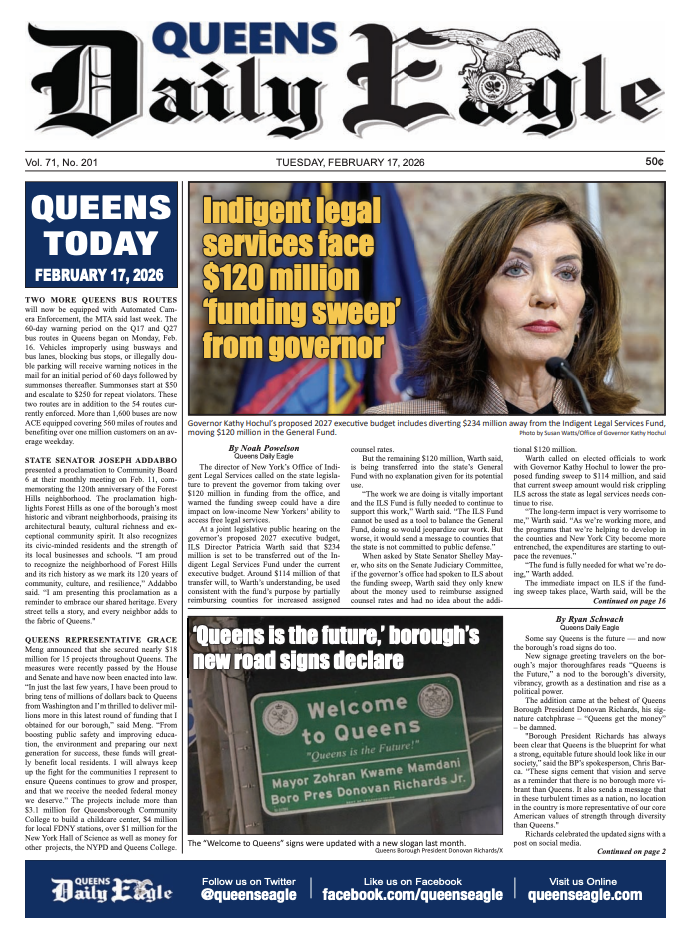Appointment of Brooklyn judge for Queens DA primary hearings designed to diffuse conspiracy claims
/Brooklyn Justice John Ingram is presiding over Queens Supreme Court hearings on the Democratic primary for Queens DA. Eagle photo by David Brand
By David Brand
When the Democratic primary race for Queens district attorney headed to Queens Supreme Civil Court on Tuesday, Queens residents and court personnel saw an unfamiliar face sitting on the bench: Brooklyn Supreme Court Justice John Ingram.
Ingram was tapped to oversee the proceedings, where the lawyers for the campaigns of Melinda Katz and Tiffany Cabán and general counsel for the Board of Elections discussed the logistics of an unprecedented, 91,000-vote recount. Ingram adjourned a hearing on the fate of at least 114 affidavit ballots submitted by registered Democrats who did not fill out their party enrollment, making their affidavit ballot incomplete and thus invalid by the letter of state law.
Katz, who leads by just 16 votes, is endorsed by the Queens County Democratic Party, while Cabán has activated Queens’ powerful progressive movement. The appointment of Ingram, an outsider, prompted some Queens residents to speculate about setting a precedent in an election riven by claims of election fraud and potential abuse by the county party, which appoints BOE officials and designates judicial candidates — claims that have been denounced by various elections attorneys.
Nevertheless, party-affiliated observers told the Eagle they worry that bringing in n outside judge signals that Queens judges — who are typically designated by the Queens County Democratic Party and run unopposed in their primary elections — are somehow compromised, or otherwise unable to preside over disputes between a County Party-backed candidate and an opponent. That perspective doesn’t sit well with some community members.
“I don’t understand why they have to have someone new come in, because we have competent judges here in Queens,” said Community Board 12 member Celeste James, a leader in the Guy R. Brewer Democratic Club. “To be frank, I feel like a judge is a judge is a judge, if they’re qualified to be a judge they can do it.”
James, a Katz supporter, was at the BOE facility in Middle Village where the recount is set to begin, likely on Monday.
At a time when outsider candidates — as well as self-styled outsiders — are lambasting the Queens Democratic establishment, the appointment of any Queens Supreme Court judge was bound to encounter pushback.
Office of Court Administration spokesperson Lucian Chalfen said the appointment was designed to diffuse that potential controversy. Chalfen called the judiciary “New York State’s independent arbiter that interprets law and applies it to the facts of each case.”
“Before all the votes in the Queens County District Attorney’s race had been counted, or any court appearances made, certain individuals had cynically implied that elected judges in Queens County could be subject to improper influence from partisan interests, knowing that social media would then attack the process without understanding what that process actually is,” Chalfen said.
“In recognition of that reality, and in consultation with the Administrative Judge for Queens Supreme Court, the Chief Administrative Judge has assigned a veteran judge, Judge Ingram, who was a gubernatorial appointment, not elected by either party, from outside Queens County, to hear arguments on the case,” he continued. “Judge Ingram will sit in Queens Supreme Court for each appearance until the case is adjudicated.”
Queens leaders and party members also downplayed the perception of precedent-setting in conversations with the Eagle.
One person familiar with the judiciary said assigning a judge from another county was the “safe thing to do” because there would undoubtedly be questions about impartiality in the tense race.
“It’s an easy decision but since these are elected judges there is always going to be someone alleging corruption, even though there is no evidence of any,” the person said on background.
Another person familiar with the judiciary said they had not heard anyone question the move.
One party veteran said the appointment of judge from another jurisdiction was “nothing unique.”
The decision attracted attention because “there’s certainly never been anything quite to this scale,” the party veteran Democrat added. “There’s certainly no precedent.”




